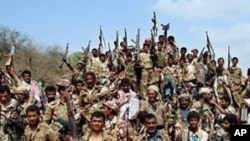The leader of a northern Yemen insurgency that has spilled into neighboring Saudi Arabia offered a truce on Monday, saying his forces will withdraw from Saudi territory. But the rebel chief added that if Saudi Arabia does not agree to abandon the war, the Houthi rebels will open new battlefronts.
Abdul Malek al-Houthi, the leader of a six-year insurgency in Yemen, announced that his forces will pull back from Saudi Arabia if the powerful northern neighbor promises to stop arming, and fighting alongside, the Yemeni government.
In a YouTube video announcement posted on the rebels' Web site, al-Houthi accuses the Saudi army of striking villages and towns in northern Yemen. He says that if Saudi Arabia does not agree to a cease-fire, his troops will launch a new offensive.
Al-Houthi's announcement comes after Army General David Petraeus, who commands U.S. forces in the region, said the war in northern Yemen could become a proxy war between the region's two most prominent countries - Saudi Arabia and Iran.
But in recent weeks, the Yemeni government has promised to soon wind down its northern war. Officials say they are now making fighting al-Qaida in the Arabian Peninsula their top priority. International humanitarian organizations, however, say the war against the rebels continues to escalate and that thousands of civilians flee the fighting every week.
Some military analysts say it would not serve the Yemeni government's interest to end the war before reclaiming control of rebel-held areas. They say the claim that terrorism is Yemen's most important battle is only to appease the West, which is far more concerned with al-Qaida than with the northern rebels.
In the markets of Sanaa's medieval Old City, many Yemenis say al-Qaida is a vague threat that is hugely exaggerated by the Western media. But the rebellion, they say, is another story.
Adel Hassan Qassam, who owns a small café in the Old City, says the northern war has caused his impoverished country so much grief that he wishes the rebels would just leave Yemen.
The Yemeni government has a different approach to ending the conflict, demanding that the rebels lay down their weapons, cede control of currently-held territory, and reveal the whereabouts of six foreigners who were kidnapped last year and remain missing.
Al-Houthi's army claims the government is responsible for the kidnappings, and has repeatedly asked the government to stop fighting first. Both sides accuse the other of targeting civilians. And because the battle zones have been nearly off-limits to humanitarian organizations and journalists since the war began in 2004, it is difficult to determine which, if any, of the accusations are true.
Yemen Rebels Demand Truce with Saudi Arabia

Leader of six-year insurgency says forces will pull back if northern neighbor stops arming, fighting alongside Yemeni government











